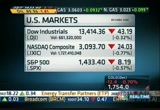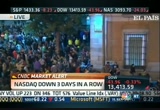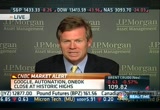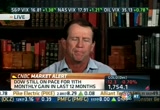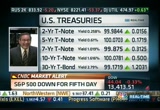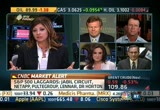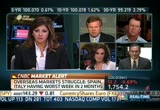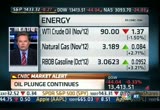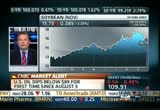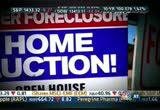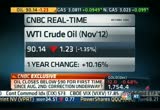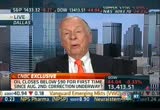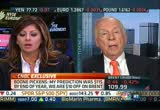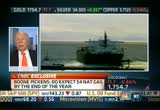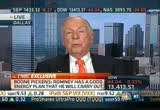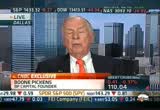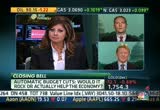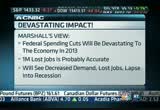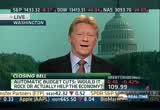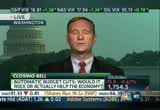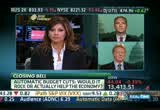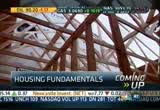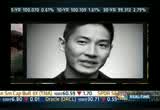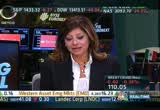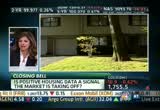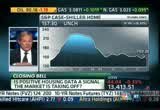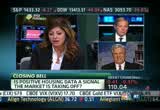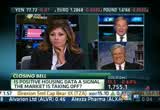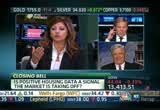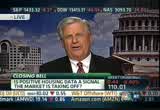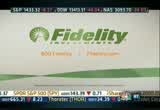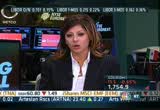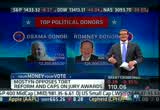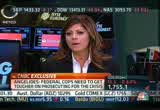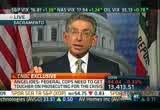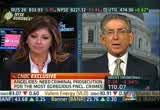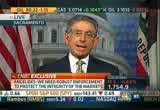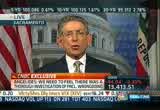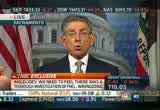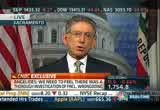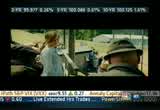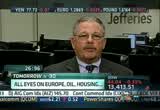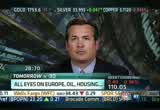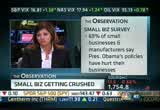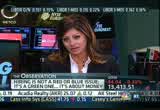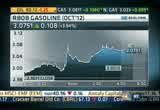tv Closing Bell With Maria Bartiromo CNBC September 26, 2012 4:00pm-5:00pm EDT
4:00 pm
the dow jones industrial average at 13,414 with the decline of 43 points. nasdaq gave up 24 points. it's these pictures that we want to show you that's really stirring fear among some investors. we're talking, of course, about the violent protests in greece and spain over tough austerity measures that people are not clearly ready to accept. are these images investors should be worried about? we bring in our team now. michelle, set the stage for us here. what happens when you're on the ground in madrid? what's your take? >> right now there are protests happening again tonight, maria. we have a live picture. this is night number two. last night it actually got violent. so far tonight it's very calm. you can see this is what's happening outside the
4:01 pm
parliament. the reason they're all out there, tomorrow spain is going to announce a new budget. you can imagine what's in there. we don't know the specific details, but it means more tax hikes, more budget cuts, more cuts to social spending, cuts we expect in some form or fashion to people's pensions. they're clearly angry. last night it got extremely violent. this morning in athens, also extremely violent for the same reasons. >> david kelly, how closely are you focused on this in terms of putting money to work? how important is this in terms of the investor class? >> i think it is important as you allocate money around the world. it's one of the reasons i would still be under with europe right now. european governments are not dealing with their economic problem. it's so frustrating to watch the ecb do everything right in terms of protecting the banks and the sovereign bond market and watch the politicians fail to do what's necessary to get these economies to grow. you have to stabilize the patient before you try and fission their long-term
4:02 pm
problems. the politicians don't do this. that means europe stays in a recession. for u.s. investors, i think it is still something of a side show. >> something of a side show. until they either come up with the austerity or -- something's got to give, right? >> because it doesn't disrupt the u.s. economy. the u.s. economy is still growing. our exports to europe are only a very small part of our gdp. the housing market recovery is much more important to the improvement of wealth. we're seeing some improvement of confidence. we're seeing rising home prices. all these are more important to the united states than what's going on in europe. >> mark, how do you see it? you invested in europe these days or no? >> a little bit, maria. you know, i guess the thing i would say about europe and soon to watch on our shores is you're going to pay more and get less. i look forward to the
4:03 pm
dislocation between price and value. i think there are a few opportunities in europe selectively. a company we own called securitas, which is a man-guarded service. it trades for about 50 krona. we think it's worth 72. we get about a 6% dividend yield. there's an example where you can find opportunity. >> everybody's looking for yield in an environment where we can't find any. rick, what are you seeing there today? >> you had a great point. everybody's looking for yields, so everybody needs to take more risk. that's the plan. the problem is, when you take more risk to get more reward, you have more risk. you know, take the word austerity and throw it out. use the word reform. one guest just said central bankers are doing all the heavy lifting. because the heavy lifting for them is easy. print, print, print, print. the real hard part is the reform the politicians need to get these economies vibrant.
4:04 pm
it's not going to be easy. that's why it looks like it's gridlock. it looks like it's fighting. in the end, it's because there isn't one easy magic wand solution. >> sure, sure. you could call it reform, michelle. you could call it austerity. you can call it cup cakes. i don't know what you want to call t but it hurts. >> the difference matters, right? here's what we found in greece. they don't want to do reforms. they don't want to break the companies in control. it's easier, believe it or not, for them to keep raising taxes and cutting spending because they don't have to do the political thing. imagine how hard it is that it's easier to raise taxes kaand cut spending than it is to do these other things. >> at some point, david kelly, when you consider the number of exports going to europe, we are looking at indirect impacts from what's happening in europe, not to mention the market dislocation. the central banks of the world flooding the market with money
4:05 pm
have really been the dominant force, which is why you have a bid to this market. >> well, i think that's right. what's happened this year is the tail risk of a collapse in europe has been sort of removed by the actions of ecb. it's hard to get a huge financial meltdown in europe while the ecb is buying everything in sight and printing money to do it. on this whole issue of austerity and reform, i think the timing is the whole point here. you've just got to get these economies growing and then impose a long-term plan of reform. i completely agree with rick on reform. right now it's like a 100-pound overweight person is wheeled in because of a heart attack. the european solution is get off the gurney and run five miles. that will kill them. you've got to stabilize the patient before you reform them. you need both. in the short run you cannot fix this problem. this is the whole problem the last three years.
4:06 pm
you cannot fix this problem through austerity alone. it will not work. >> david, are you invested in this market right now? >> oh, absolutely. there's a pull back going on right now. we've had a very good four months or so. stocks look somewhat cheap in absolute terms and very cheap in relative terms compared with fixed income and cash. >> all right. we'll leave it there. thanks, everybody. great conversation. see you soon. appreciate your time tonight. big drop, meanwhile, for the price of oil again. should investor s be concerned about this 10% plunge? john, is this a red flag for investors? to what do you attribute this move for oil, and how does this impact the market? >> i think the crude oil has been the conscious of this market since qe-3 was lost. crude oil keyed almost immediately off why qe-3 was being undertaken. that's because of the poor
4:07 pm
economic environment we've been in. all these things pointing to a slow down, not to mention the swing demand center of the world, china, slowing down and having problems really has put the brakes on what was an impressive rally. we've given back 10% of that now already in rapid fashion. i think it's a clear signal for investors across the markets to watch out. there's a ral slowing going on. >> there's a real slowing going on, and it's being reflected in the price of oil. where else is it being reflected? might we see other commodities start following oil lower? >> you're starting to see the agricultural commodities break down a bit. you saw soybeans down around 15. that could get into the low teens quickly here. also, on to that oil story was the warnings from caterpillar, norfolk southern, fedex. again, this highlights that the transportations are sliding. they're slowing demand for energy out there. not only here, but in the world.
4:08 pm
so i'm just hoping that the stocks can hold on to their gains by keying off better housing numbers, which won't help oil but could certainly add to equities. i think the equities are going to have a hard time ignoring what the oil seems to be signaling. >> all right. we'll leave it there. thanks for your insight. leave it here. we have more on the oil slide on this busy wednesday edition of the "closing bell." oil continues its slide but boone pickens says that's all the more reason to focus on natural gas. we'll find out why he thinks that's the way of the future and the auto industry. then, he wants to know why no one on wall street is in handcuffs yet over the financial crisis. find out exactly which ceos he blames and what he says the department of justice needs to do right now to punish them. plus, home builders are soaring but short sellers are hot on their trail. we're bringing in experts to
4:09 pm
look at the state of the recovery and which side of the housing trade you should be on. it's all coming up on the "closing bell." o spot. you have to dig a little. fidelity's etf market tracker shows you the big picture on how different asset classes are performing, and it lets you go in for a closer look at areas within a class or sector that may be bucking a larger trend. i'm stephen hett of fidelity investments. the etf market tracker is one more innovative reason serious investors are choosing fidelity. get 200 free trades today and explore your next investing idea.
4:11 pm
4:12 pm
barrel for the first time since august 2nd. prices are now down better than 9% in just less than two weeks, putting crude oil in correction territory. clearly economic concerns in europe and the united states having a big factor here. plus, take a look at the huge move in gasoline prices today. prices surging north of 3% after a refinery fire in canada. we get reaction to all of this from legendary energy investor boone pickens. good to see you. thank yous for joining us. >> thank you. >> is it fair to say this is a free fall? oil prices in a bit of a free fall for two weeks now. what do you think is behind this? >> well, you've got the chinese economy slowing down, and our industry in the united states has done very well. they found a lot of oil for us. if you remember my prediction, i said you'd be 115 by the end of the year, we hit that on september 14th at 118.
4:13 pm
we're now, i think, what, $10 off that. i was talking about brent all the time. i don't try to predict the wti. i also said we would have $4 gas by the end of the year, natural gas. i believe that to be the case. >> so how much lower do you think prices go? >> i don't know. i don't think much lower. maybe another $5, but i do think this, that we have enough oil that we've got 750 million barrels in the strategic petroleum reserve. i would start looking at that pretty close to take maybe half of that out of there. we don't need to store that much oil. >> okay. now, you've said the u.s. has the natural resource to one day stop importing opec oil. i want to ask you about that. this is obviously very important. if the u.s. would commit, how soon can that switch happen?
4:14 pm
>> how soon what? >> that we would get less dependent on oil from opec. >> well, now just start at the top and bring it down right quick. there are 20 million barrels a day used in the united states. about 11 million we import. of the 11 million we import, 4.5 million comes from opec. we don't need to do that. we get the strait of hormuz, persian gulf, we're over there with a fifth fleet. there's 17 million barrels a day coming through the straits. we use 2 million of that. about half of the total from opec we get out of the persian gulf. we can cover that in north america rather easily. so we don't have to have the fifth fleet in the persian gulf to protect 17 million barrels of oil. only 2 million of it comes to the united states. the other 15 million goes to
4:15 pm
china and europe and around the world. i don't know why we're spending the money to protect the oil. >> and what do you think -- how does this play out? i mean, on the political front energy remains the key issue, and even the presidential election. which candidate has the better energy plan in your view? >> well, obama has no energy plan. he talks about energy a little bit. he never has a plan. romney has a good plan, and i believe romney will carry it out. that all the people that have run for president since nixon, republican and democrat, have always said elect me and we'll be energy independent. romney has not said that. he has said with a north american alliance, that we can bring together mexico, canada, and the united states, and we can be energy independent using all of north america. but that's good because they're good neighbors. we work well together. all that can be accomplished,
4:16 pm
but romney is realistic about a plan. his plan is use our own resources. >> and we know that's a job creator. do you think he has a shot to win the election? >> oh, i think he will win the election. i think he has energy as a big component. there are 30 states in the united states now that produce energy. when i went in the energy business a long, long time ago, there was only nine states. there are 30 states now. so millions of jobs are created by the oil and gas industry in the united states. >> right, right. let me get your take on natural gas. i'd love to know where you're seeing opportunity, how you're invested in the energy space. you've been a backer of natural gas. honda has the civic natural gas car. can the industry really transform to natural gas powered vehicles? >> well, there's no question the technology is well known.
4:17 pm
there are 13 million vehicles in the world today on natural gas. only 130,000 of them in the united states. we have more natural gas than any other country in the world. how could that be? it's because the leadership in washington has not, one, understood the resources available to us in america, but, two, they've shown no leadership to get on our own resources. use our fuel here. quit importing oil from opec. >> yep. well, we'll leave it there. boone, always nice to have you on the program. thank you so much. >> sure. thank you. >> we'll see you soon. boone pickens joining us on oil. again, traded down today. surprise. libertarian think tank cato says cuts will not have a big impact on the economy. later, what's the housing trade? short sellers are out in full force. we'll talk to a pair of housing
4:18 pm
insiders about what lies ahead. back in a moment. [ male announcer ] for the saver, and a big first step. for the spender who needs a little help saving. for adding "& sons." for the dreamer, planning an early escape. for the mother of the bride. for whoever you are, for whatever you're trying to achieve, pnc has technology, guidance, and over 150 years of experience to help you get there. ♪
4:19 pm
♪ [ male announcer ] introducing a stunning work of technology. introducing the entirely new lexus es. and the first-ever es hybrid. this is the pursuit of perfection. with scottrader streaming quotes, any way you want. fully customize it for your trading process -- from thought to trade, on every screen. and all in real time. which makes it just like having your own trading floor, right at your fingertips. [ rodger ] at scottrade, seven dollar trades are just the start. try our easy-to-use scottrader streaming quotes. it's another reason more investors are saying... [ all ] i'm with scottrade.
4:20 pm
a short word that's a tall order. up your game. up the ante. and if you stumble, you get back up. up isn't easy, and we ought to know. we're in the business of up. everyday delta flies a quarter of million people while investing billions improving everything from booking to baggage claim. we're raising the bar on flying and tomorrow we will up it yet again. welcome back. so you think sequestration is bad? think again. my next guest says those automated spending cuts will have a positive effect on the economy. catos says the much talked about 1 million jobs figure is inaccurate and misleading. chris, really?
4:21 pm
no concern? >> no, not really. we have to keep in mind that every dollar that the government spends is taken out of the economy, out of the private sector. if we focus just on the jobs lost and not on the jobs that would be created by redirecting those resources into other industries, that's the big picture. i don't doubt -- i'm not disputing that it's going to be disruptive for the people involved. we've seen this happen before. when you look at the amount of money we're talking about under sequestration, it is, in fact, less steep than other post-war draw downs. that's what we're in right now. the war in iraq is ending. the war in afghanistan is drawing down. it's understandable that u.s. military spending would start to go down. >> well, will you -- you say it will be devastating to the economy. give us your take. >> well, i would like to make three points. first of all, defense will and can make a contribution to deficit reduction. secondly, this is not the way. the sequester is the worst way to go about reducing defense spending. thirdly, the right way to do it
4:22 pm
is to go after taxes, raise tax revenue and cut the entitlement programs, which are driving long-term spending growth and debt creation in this country. it's not defense, which is on a relatively stable downward path. so, you know, i would agree that we need to cut our deficits. it's just the wrong way to do it. >> so what is the better way to do it? here we have, you know, automatic cuts coming, automatic tax increases coming. a lot of people predicting that 2013 will be a recession as a result of this. we haven't even heard from the defense companies in terms of how many jobs they're about to cut because of it. so what's the best way to do it? >> keep in mind nobody wants the sequester to happen. maybe chris and his colleagues at catos are an exception. the idea of a sequester is so awf awful, it would cut so deeply into spending, it should never happen. it's a doomsday device, which is trying to get congress to do its real job, which is to focus on
4:23 pm
taxes and sbentitlements get a grand bargain. nobody wants it to happen, but we're playing a big game of chicken because nobody wants to do the other things that are necessary to get those deficits down. but look, if we cut $55 billion out of defense, which is what the sequester would do, in one year alone, in 2013, that's going to cause havoc at the pentagon. it's going to cause a lot of immediate job loss and pain. >> chris, what do you think? i know you see an economic benefit to this, but it's going to be ugly in the process, isn't it? >> we have to remember that military spending remains near historic highs in real inflation-adjusted dollars. we're still spending far more than we did to defeat the soviet union in the cold war and in the '90s when the united states was remarkably secure and prosperous. will has put it on the table. the point of sequester, why the democrats put this on the table, was to convince republicans to cave on increasing taxes.
4:24 pm
they want more revenue. they don't want to cut spending. it's a pretty clear choice. i think we have a spending problem in this country, not a revenue problem. that means spending on both defense programs and non-defense programs. >> right. >> i would agree that sequestration isn't the best way to do it, but we haven't come up with any other way to cut spending. spending has continued to go up and up and up and the deficit is rising right along with it. >> what about the jobs argument? some people say 1 million jobs are at stake. >> right. if jobs were all we cared about, 130 years ago there were a lot more people employed in the agricultural sector. if we were worried about jobs, we would ban mechanized tractors and whatnot and have people cut wheat by hand. the fact there are fewer people employed in the defense industry over the last few years, defense contractors have been making more money and cutting employment. why? because they're becoming more efficient. we like this when this happens in every other sector. in defense, for some reason, we
4:25 pm
want the pentagon to be a jobs program. i think most americans recognize that's not what it should be doing. it should be protecting us from harm and nothing more. >> can it do that with the cuts coming? >> absolutely. the united states still spends far, far more than any other country, any other combination of countries in the world. most of what we spend on defense right now is on ovther countrie that could defend themselves. why are we defending access to oil for other places that consume it? >> all right. we'll leave it there. thank you very much. one of the most important issues for the investor class out there. see you soon, guys. thanks. up next, four years after the height of the financial crisis and still no criminal prosecutions? i'll speak with the former head of the financial crisis inquiry commission in a few minutes. he's urging a tougher probe into the crisis. up next, is wall street's love affair with housing over? the home construction etf having the worst day since june today.
4:26 pm
take a look at the housing market fundamentals. back in a moment. silverado! the most dependable, longest lasting, full-size pickups on the road. so, what do you think? [ engine revs ] i'll take it. [ male announcer ] it's chevy truck month. now during chevy truck month, get 0% apr financing for 60 months or trade up to get the 2012 chevy silverado all-star edition with a total value of $8,000. hurry in before they're all gone! try the #1 gastroenterologist recommended probiotic. align. align naturally helps maintain digestive balance. ♪ ooh, baby, can i do for you today? ♪ try align today.
4:27 pm
4:28 pm
4:29 pm
welcome back. have you seen the latest housing data? low rates pushing the number of mortgage applications higher last week. new home prices hit five-year highs in july. while major metro areas saw prices rise more than 1.5%. forget sitting on the bottom. david liken of mortgage banking solutions says home values have a lot more room to slide. good to see you, gentlemen. thank you so much for joining us. billy, how can you make the case that the housing market is off the bottom? >> first off, it can't get much lower than it was. i think the fact that money is starting to free up and, you know, the more liquidity we pump into the market and the cheaper the liquidity, the higher and faster houses are going to sell. so, you know, we're seeing in our space that people are buying -- as long as the house is staged right and in good condition. >> so -- and david, you think prices need to go back to where
4:30 pm
they were in '95 and '96 to get back to normal. is that really realistic? >> no, what i was saying in those comments is we could see it go back. that's a worst-case scenario. i'm hoping billy is right, that we're at the bottom. i've been saying we see a bottom forming. we're not seeing, maria, the stable buyer come back in the market. there's still too much uncertainty. if you talk about interest rates, qe-3 pushed rates down all of 13 basis points. they're at record lows. it still hasn't moved things of any significant proportion. >> so what is what is going to move the needle, billy? >> i think one thing important is if you look back -- and i know david was talking '95. i don't necessarily agree with ' '95, but if you look at where we are today, we hit 2002 values again. if you look at subprime mortgages as a percentage of the whole market of mortgages and you look at what happened from
4:31 pm
'02 when there was less than 10% of the market to '05 when it was 50, 60% of the markets those were artificial values. if you extrapolate back and look at '02 and go, '02 is normal. less than 10% were subprime borrowers. new home market in '05 and '06 hit 60% of every new home as a subprime borrower. those were artificial values. i concur with david that the things have to normalize. i think that the more media attention is great. this past year, great media coverage in an upbeat way. the prior two years, you'd be scared as heck to buy a house. it's a combination of the banks got to get faster and a little more cognizant of people having banged up credit, it doesn't necessarily mean they're a bad borrower. >> right, right. david, we have the looming fiscal cliff issue. should that be a concern for the
4:32 pm
housing market? >> absolutely. we got so many factors out there. and is it a cliff or a wall is the biggest concern. we look at who's been buying the properties. it's investors, not general public going in there feeling good about the economy. look at what happened just recently, just today. the statistics came out about home sales on new construction. builders got ahead of their scheme. it's good to see optimism in the market. let's not get overly confident now that they're building more inventory and contributing to an extension of the bottom. >> david, i think one thing that's going to affect this, and i hate to say it, but with everything going on in the middle east and mexico and all these other places in the world, there is going to be no place like the united states of america to own a home, and i don't think you can eat a gold bar, and you can't put a gold bar over your head and protect yourself from the rain. i think all the unrest in the world is going to affect positively housing. not necessarily the stock market. but housing in america, i think,
4:33 pm
is going to be a stable bet. it can't get any lower. >> particularly where rates are right now, right? >> absolutely. >> the combination of rates and the fact that we are still, despite everything, the most stable economy. yes, we have so many fiscal problems. i talk to people in the middle east. if you're upper-middle class or rich and the middle east or mexico or any of these other places with unrest, you are getting your family out. they are your number one priority. get the family to america. >> that's -- i understand what you're saying. go ahead. >> that may explain why we have so many foreigners buying property here in america. we have so many different people from other foreign nations coming in and making investments in rental property here. you're absolutely right, bill. this is the greatest place to be in a real estate market. even uncertain as it is. >> uncertainty, though, it's an important part of the economy. so we're still waiting to see this economic recovery getting some traction. so is there a catalyst on the
4:34 pm
horizon other than your expectation that foreigners are buying in the u.s.? >> well, number one -- >> go ahead, billy. >> i kind of think we're winning as the world's tallest midget. that's the best way i can explain it. we're still going to be the most powerful place and the safest place to put your money. while i don't think the stock market is, you know -- the stock market always moves with the wind and the pendulum swings too fast. housing, even commercial real estate, it's below replacement costs, which means it's like getting the land for free and having home depot sell you the materials for half the price. >> on sale. you're right, billy. here's the other side. i think that is causing builders to need to back up and rethink their expansion strategies. that's one of the things i would be advising builders. i think that's why we're seeing the builder stock get hit as hard as it is. we're going to be seeing the consistent solid bottom here.
4:35 pm
i hope we're right these are the bottoms and we go up and see good, solid growth. >> by the way, the national builders got a challenge. when subprime was at its peak, they were at 2.2 million homes a year whereas the average should probably be more like 1 million. so i think the public home builders got a challenge in store for them, particularly the nationals. i'd stick with the regionals. >> a lot of supplies still an issue. gentlemen, thank you very much. we appreciate your time tonight. >> thank you. up next, putting the bad guys behind bars. my next guest says more needs to be done to hold banks and ceos accountable for the worst depression since the great depression. later, our wealth editor will join us with a list of the top political donors backing president obama and mitt romney. wait until you see who's on top. as we take a break, look at how the european markets fared today. back in a moment. looking for a better place to put your cash?
4:36 pm
here's one you may not have thought of -- fidelity. now you don't have to go to a bank to get the things you want from a bank, like no-fee atms, all over the world. free checkwriting and mobile deposits. now depositing a check is as easy as taking a picture. free online bill payments. a highly acclaimed credit card with 2% cash back into your fidelity account. open a fidelity cash management account today and discover another reason serious investors are choosing fidelity. bob... oh, hey alex.
4:37 pm
just picking up some, brochures, posters copies of my acceptance speech. great! it's always good to have a backup plan, in case i get hit by a meteor. wow, your hair looks great. didn't realize they did photoshop here. hey, good call on those mugs. can't let 'em see what you're drinking. you know, i'm glad we're both running a nice, clean race. no need to get nasty. here's your "honk if you had an affair with taylor" yard sign. looks good. [ male announcer ] fedex office. now save 50% on banners. now we need a little bit more... a little bit more vanilla? this is great! [ male announcer ] at humana, we believe there's never been a better time to share your passions... because the results... are you having fun doing this? yeah. that's a very nice cake! [ male announcer ] well, you can't beat them. [ giggles ] ohh! you got something huh? whoa... [ male announcer ] humana understands the value of spending time together that's a lot of work getting that one in! let's go see the birdies. [ male announcer ] one on one, sharing what you know. let's do it grandpa. that's why humana agents will sit down with you,
4:38 pm
to listen and understand what's important to you. it's how we help you choose the right humana medicare plan for you. because when your medicare is taken care of, you can spend more time sharing your passions. wow. [ giggles ] [ male announcer ] with the people who matter most. i love you grandpa! i love you grandma! now you're a real fisherman. [ male announcer ] humana. welcome back. we've all heard the politics is a rich man's game. this run for the white house
4:39 pm
gives that saying a whole new meaning. the romney and obama camps could spend as much as $750 million on their campaigns. our wealth editor robert frank has been reeling off the list of each candidate's biggest donors. >> thanks, maria. this is the big moment. we've heard a lot about the coke brothers in this election. their political agenda, their money. it might be a surprise they're not our number one gop political donor. they're not even in the top five since their donations are largely undisclosed. the number one funder for romney is, in fact, sheldon, the owner of the vegas sans casino. experts say if you add up all his political giving this cycle, it's been over $70 million. that would be a brand new record. in fact, three times the previous record. so what does he want? he's a strong supporter of israel. he's an advocate of rolling back the power of union, wants to
4:40 pm
strengthen small business, and he feels the obama administration has not been accountable to voters. now, sans is under federal investigation for possible money laundering. though, he says these investigations are partly because he's funding the opponent to obama. the top-ranked democrat isn't in the same league. in fact, he wouldn't even make the top five in the gop club. let's look at the difference here. it's steve mostin. 2.2 puts him as the top donor. that's more than one-tenth of the amount. now, he's a trial lawyer in houston. he made a fortune from hurricane lawsuits. he's opposed, no surprise, to tort reform and caps on jury awards. he's going head to head with fellow texan romney supporter bob perry. he's the number two romney donor. he helped fund a group that distributed a flyer attacking
4:41 pm
mostyn. he fought back with a anti-perry website. seems that even the donors now are behaving more like the politicians that they support. back to you. >> pretty amazing, robert. you know, money has been talking. it's not just for the presidential candidates, right? you're also seeing money talk for, you know, changes in the house and senate. >> yeah, and, you know, the amount of money in this election, this will be by far the most expensive election ever. the unlimited amount that people can now spend, you know, whether this makes a big difference -- if romney loses, people will say super pacs didn't make a difference. if he wins, they'll say it was a deciding factor. i think the jury is still out on whether this money truly changes voters' minds. >> all right. we'll see. robert, thanks so much. it's been four years since the financial crisis exploded. millions of jobs and homes have been lost. banks have failed. investors have certainly become nervous about the markets. a commission that investigated the cause and recommended fixes has come and gone. no the chairman of that
4:42 pm
commission wants to know why wall street executives are not being criminally investigated and prosecuted for their role in one of the worst economic disasters in modern times. he joins me now. he's also the former california state treasurer. good to have you back on the program. welcome. >> always good to be with you. >> you say the justice department hasn't focused enough on criminal prosecution of wall street executives. who do you believe should be prosecuted? >> well, i think this is not a matter of revenge. it's a matter of righting wrongs. it's a matter of deterrence. it's about making sure that we have the right kind of deterrence so we don't have another financial meltdown. this isn't also just at the justice department. there's been a culture now for decades of weak enforcement where banks pay fees. they break the rules. they pay fines. then they just go back to business as usual. we need to break that pattern with real investigations, real enforcements, real prosecution,
4:43 pm
criminal prosecutions for the most egregious fines as well as civil penalties with teeth. i think to do that you need resources. for example, in 1989 in the wake of the snl crisis, a republican president, george h.w. bush, asked for $50 million to investigate the snl crisis. president obama has asked for $50 million that congress hasn't given him. i might add, maria, as we talk today, the republicans in the house of representatives are trying to cut the budgets of enforcers like the sec and the commodities future trading commission. so we need robust enforcement to protect the integrity of the markets. >> but how much credence do you put into the idea it's very difficult to actually prove intent in fraud, the intention to actually commit fraud? could it be we've seen these investigations come and go and they can't come up with actual evidence of fraud, that these guys were not necessarily fraudulent but just stupid?
4:44 pm
>> well, look, first of all, i think what you need to have is if you don't look, you will not find. you need an intense level of resources to go after these crimes that as you were saying in your lead up have caused immense damage to the economy. trillions of dollars of household wealth wiped away. 4 million foreclosures. a devastating economic down turn to that's left, as you know, millions still unemployed today. let me give you an example. the commodities future trading commission has a total budget of about $200 million. the republicans want to cut that to $180 million. president obama wants to increase it to $300 million. in the barclays settlement alone for manipulation, they levied a fine of $200 million. i think it's a matter of resources. in the wake of snl crisis, 1,000 executives pled guilty or were convicted of felonies. we have not seen the kind of aggressive pursuit that we saw last time, and we do need to see it. look, i don't think we ought to
4:45 pm
be demanding heads on a stake. we don't want that kind of justice. we have to come away with a sense there has been a thorough and full investigation of potential wrongdoing. i still think that that's on the table, maria. >> so you think it's just that they don't have the resources to actually look as effectively as they should be. that's the reason you think we haven't seen any criminal prosecutions. >> i think that's part of the season, but i also think over the last two or three decades there's been a culture of weak enforcement where there's wrongdoing. a bank is assessed a penalty. for example, goldman violated some protocols around what are called huddles between traders and analysts designed to protect against insider trading. they got fined $22 million, which is the same as seven hours of their revenue. even the fine for their big securities fraud case, the mortgage securities fraud case, $500 million. that was about 2% of their
4:46 pm
overall revenues for the year. the day they paid the fine, their stock rocketed up by billions of dollars. so there's really been no real enforcement. this has been a cultural problem, and it takes a while to change. now, i do think that gary gensler at the commission is trying to change that. i believe mary schapiro has been trying to change that. i hope the department of justice is changing that. but there's been a culture of very weak enforcement. it's like if someone robbed an snl, took $1,000, they could settle for $25 and no admission of wrongdoing. you tell me. if they could do that, would they do it again? we've seen that time and time again in the financial industry. maria, today when we read the business section, it almost reads like a wrap sheet. you have money laundering by ing direct and standard charter bank. you have bid rigging by a bunch of banks like wells and ubs and
4:47 pm
jpmorgan that rob communities of millions of dollars. you have the libor scandal. it just goes on and on. i think we have to -- for the protection of all the good people in the financial industry and the integrity of our markets, we need much more vigorous enforcement. >> so what do you think the impact of these prosecutions, you know, prosecuting wall street executives, what would be the impact on the market in your view? >> i think positive. if you send out the message that ethical transgressions won't be tolerated, you re-enforce the integrity of the marketplace. after all, tens of millions of people put their money at risk in our marketplace on the assumption that there's fair and honest dealing. when you have money laundering, bid rigging, price fixing that, shatters the confidence of investors. so i think it's fundamentally important to the integrity of the marketplace. and, you know, as i said, we have seen some positive signs. but i'm very concerned at the
4:48 pm
enormous push back of wall street. you were talking about contributions in the lead up to this. wall street has contributed $200 million to federal elections in this cycle. they've spent $300 million on lobbying in the last two years alone to roll back regulations, to cut the buckets of the very agencies that are supposed to be looking out for violations that shake the market. so again, not hang man justice, but vigorous enforcement. >> phil, good to have you on the program. thanks so much. >> always great to be with you. >> see you soon. well, a number of key readings on the economy out first thing tomorrow morning. we'll set you up for the opening bell. we'll tell you what to watch out for. stay with us.
4:49 pm
♪ [ male announcer ] this is karen and jeremiah. they don't know it yet, but they're gonna fall in love, get married, have a couple of kids, [ children laughing ] move to the country, and live a long, happy life together where they almost never fight about money. [ dog barks ] because right after they get married, they'll find some retirement people who are paid on salary, not commission. they'll get straightforward guidance and be able to focus on other things, like each other, which isn't rocket science. it's just common sense.
4:50 pm
4:51 pm
4:52 pm
some compositional changes will portend for slower growth and will grow 1% to 1.5% in q3 and q4 paving the way for the fed to convert operation twist into a q.e. with purchases of 30-year treasury bonds. >> we'll watch that. dan, you're up for tomorrow's trading session? >> maria, the market's going to look at a couple of things. initial claims, durable goods, gdp as ward said. if they show weakness, the market could struggle a little more. but we look for companies with strong earnings, capability to grow and a sound financial structure to support that growth. we think at 14 times next year's earnings, this market is reasonably valued and we'll find good opportunities there. >> we'll watch it as well. duff, over to you with 30 seconds on the clock. >> tomorrow, we're looking forward to the eu economic
4:53 pm
sentiment report. we find opportunities investing in high-quality european companies, as long as they're diversified globally. nova is a company that's based in denmark be significant exposure to china where there's an increasing epidemic of dykes. the stock is up 60% in the last 12 months, due on recent news the government is going to expand health care to 90% of the population in the country. >> we'll leave it there. gentlemen, thanks so much. we'll be watching all of that tomorrow. see you soon. thank you, guys. up next, my thoughts on a new survey showing small business is holding up on hiring because of the president's policies and the economy. stay with us. erful trading tools for all. like our all-in-one trade ticket. we put strategies, chains and positions all on one screen. start trading today with
4:54 pm
optionsxpress by charles schwa when you take a closer look... ...at the best schools in the world... ...you see they all have something very interesting in common. they have teachers... ...with a deeper knowledge of their subjects. as a result, their students achieve at a higher level. let's develop more stars in education. let's invest in our teachers... ...so they can inspire our students. let's solve this. humans -- sometimes life trips us up. and sometimes, we trip ourselves up, but that's okay.
4:55 pm
at liberty mutual insurance we can "untrip" you as you go through your life with personalized policies and discounts when you need them most. just call... and speak with a licensed representative about saving on your policy when you get married, move into a new house... [crash!] or add a car to your policy. don't forget to ask about saving up to 10% when you combine your auto and home insurance with liberty mutual. security, coverage, and savings. all the things humans need to make our beautifully imperfect world a little less imperfect. call... and lock in your rate for 12 months. liberty mutual insurance. responsibility. what's your policy?
4:56 pm
4:57 pm
those business owners say president obama's regulatory policies have hurt their business. in fact, the poll finds some 67% say there's too much uncertainty in the market to expand, to grow or to hire right now. amazingly, a majority of those survey said that other countries like china and india are more supportive of small businesses and manufacturers than the united states. they cite the expense of health care and a new regulatory environment that has been too onerous. this survey was a mix of democrats and republicans. the statistics suggest even democrats and independent business owners criticize the president's policies. only 46% of those polled participants were identified as republicans. in other words, this is not a red or blue issue but a green issue. that's it. green. about money. business owners are saying loud and clear that they will not operate back to business as usual and add heads to the payroll without having some clarity in front of them. that's why we keep bringing up
4:58 pm
the fiscal cliff and the implications of going over that cliff. business wants clarity and the environment to grow, not heavy expenses and uncertainty. it was a quiet day on this jewish holiday. the dow jones industrial average lost 34 points. volume picked up at the end of the day. 738 million shares traded here at the dow. nasdaq down 24 points. technology once again, the leadership group on the downside at 3,093. mixed stories of the day, look at this chart, oil down another 1.3%. crude oil has lost almost 10% of its value in the last two weeks. we're now sitting at $90.14 a barrel. energy stocks have reacted as well with oil prices moving lower. in the meantime, gasoline traded up. gas up 3.6% recently. real disconnect between oil and
4:59 pm
gasoline. that does it for "closing bell." thank you for being with me. have a great night. follow me on twitter and google plus. "fast money" is up next. don't miss melissa's interview with wilbur ross. it starts right now. i'll see you tomorrow. the pain in spain spreads to the u.s. should you just grin and bear it? >> even though our outlook for the economy is moderate, we think we can find good stocks today to be good long-term holdings. sit time to get cozy with your around-the-way girl? >> don't call a comeback. i've been saying it for years. >> maybe you should just hold your fire. >> fair value is probably somewhere down 5% to 10%. right now, i think you have to shoot with a rifle and not with a shotgun. >> the commodities king has a golden ticket and guy adami
236 Views
IN COLLECTIONS
CNBC Television Archive
Television Archive  Television Archive News Search Service
Television Archive News Search Service 
Uploaded by TV Archive on

 Live Music Archive
Live Music Archive Librivox Free Audio
Librivox Free Audio Metropolitan Museum
Metropolitan Museum Cleveland Museum of Art
Cleveland Museum of Art Internet Arcade
Internet Arcade Console Living Room
Console Living Room Books to Borrow
Books to Borrow Open Library
Open Library TV News
TV News Understanding 9/11
Understanding 9/11